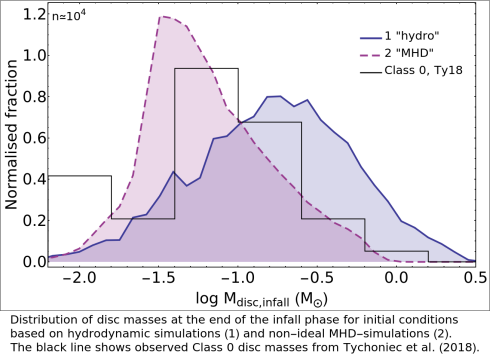The influence of infall on the properties of protoplanetary disks
- 1University of Bern, Physics Institute, Space Research and Planetary Sciences, Bern, Switzerland (oliver.schib@space.unibe.ch)
- 2Institute for Computational Science, University of Zurich, Switzerland
The formation of protoplanetary discs is central to planet formation because it sets its initial conditions. Planet formation may also occur while the star-and-disc system is still being formed.
In this work we perform an extensive parameter study of the formation and evolution of protostellar and protoplanetary discs that includes many key physical processes and produces a population of stars in agreement with the initial mass function.
We constrain physical quantities like mass, radius, lifetime and gravitational instabilities of protostellar and protoplanetary discs by studying their evolution from formation to dispersal.
We perform a total of 50'000 simulations using a 1D vertically-integrated viscous evolution code, studying a parameter space of final stellar masses from 0.05 to 5 Msol.
Each star-and-disc system is set up shortly after the formation of the protostar and fed by infalling material from the parent molecular cloud core. Initial conditions are chosen based on the results from the radiation hydrodynamics population synthesis of circumstellar discs by Bate (2018). We also consider a different infall prescription based on the results of Hennebelle et al. (2016) in order to assess the influence of magnetic fields on the disc formation.
We find that protoplanetary discs are very massive early in their lives. When averaged over the entire stellar population, we find ~0.3 and ~0.1 Msol for systems based on hydrodynamic or MHD initial conditions, respectively. Around stars of mass ~ 1 Msol, we find disc masses of ~0.7 and ~0.2 Msol for "hydro"/"MHD", respectively. Furthermore, the inferred total disc lifetimes are long, ~5 - 7 Myr on average. This is despite our choice of a high value of 10-2 for the background viscosity α-parameter.
In addition, we find fragmentation is common in systems based on hydrodynamic simulations, with more fragments of larger mass formed in more massive systems. In contrast, magnetic fields may suppress fragmentation completely.

How to cite: Schib, O., Mordasini, C., and Helled, R.: The influence of infall on the properties of protoplanetary disks, Europlanet Science Congress 2020, online, 21 Sep–9 Oct 2020, EPSC2020-1025, https://doi.org/10.5194/epsc2020-1025, 2020.

